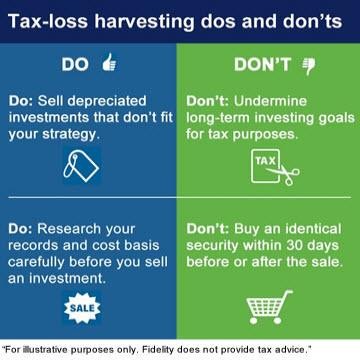What You Need to Know Capital Gains Tax Loss Harvesting
Post on: 16 Март, 2015 No Comment

What You Need to Know — Capital Gains & Tax Loss Harvesting
Last year I wrote about two topics that received extra attention from our members, capital gains and tax loss harvesting. Because we are coming to the end of the year I thought it would be a good idea to reiterate how you can use capital gains and tax loss harvesting in your favor at tax time.
First, let me define how capital gains distributions work.  Mutual funds buy and sell securities, or investments, throughout the year.  When a fund sells a security for more than the purchase price, the appreciation is considered a capital gain.  If the fund has owned the security for less than a year, the gain is considered short-term.  If the fund has owned the security for over a year, the gain is classified as long-term.  The significance of the holding period affects taxation.  Short-term gains are taxed at the same rate as ordinary income which can be as high as 35% for some individuals.  Long-term gains on the other hand, are taxed at a special rate of 15% or 5% for those in the lowest income tax bracket.
A fund is required to distribute these gains annually to their shareholders in order to avoid taxation at the fund level.  While funds can distribute these gains throughout the year, most funds distribute their gains mid to late December.  When a fund makes a capital gains distribution, the net asset value (NAV), or share price decreases by an equal amount.  For example, if a fund makes a $0.75 gain per share distribution when the NAV is $38.00 then the NAV will drop to $37.25.  If they haven’t already been paid out and you would like to know whether any of the funds that you own will be paying out capital gains distributions, you can contact the sponsoring fund company. Most fund companies declare the coming year-end distributions in late November to early December.
In company-sponsored retirement plans, these distributions are reinvested automatically into the respective mutual fund and any taxes due will be deferred.  So unless you log in to your retirement plan account on a daily or weekly basis, you may not even notice the gains distribution until you receive your quarterly statement.  If the mutual funds are held outside of a company-sponsored plan, you have the option to have the distributions reinvested or paid to you directly.  Taxes will be due when you file your taxes for any capital gains distributions received in a taxable account, whether reinvested or paid to you directly.
If you have incurred or will incur capital gains, tax loss harvesting may be an option for reducing the tax burden of the gains.  Tax loss harvesting is selling securities at a loss to offset capital gains.  Loss harvesting is typically used to offset short term capital gains which as you may recall from above are taxed at your ordinary income tax rate.  Knowing when and how to use tax loss harvesting is an important part of tax planning strategy for any taxable account you may have.
In addition to offsetting gains with your recognized loss, you can use losses that exceed your capital gains to offset ordinary income, up to a maximum of $3,000 per year.  Losses that exceed the $3,000 threshold can be carried forward into future tax years.
The IRS has ruled that if you do sell securities for a loss, you must wait 30 days before buying the same or “substantially identical” securities.  For those of you that would like to claim the loss, but do not want to be out of the market for 30 days, an option would be to purchase a security similar in investment objective.  For example, you could recognize losses from a fund such as Columbia Value & Restructuring to offset capital gains you may have. You could then purchase a similar fund such as the Wasatch-1 st Source Income Equity Fund or the Croft Value fund. (This example is purely for illustrative purposes only and is not intended to be a recommendation for any of the above funds.)

Tax loss harvesting can be a very effective tool for reducing your year-end tax bill. In order to find out if you should be taking advantage of tax loss harvesting, please consult a tax adviser.  In the meantime, if you have any questions regarding capital gains or if you would like to discuss your Smart401k account please feel free to contact us.
Buck Wendel, Investment Adviser
Comments
Currently, there are no comments. Be the first to post one!














